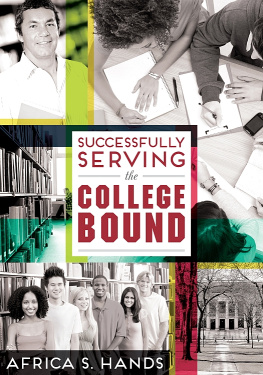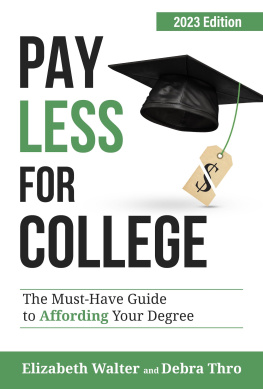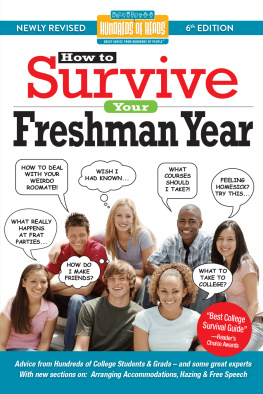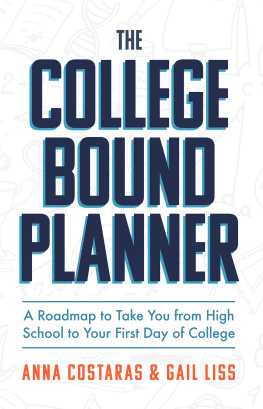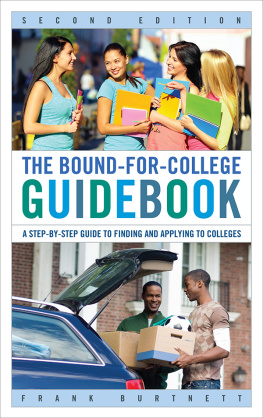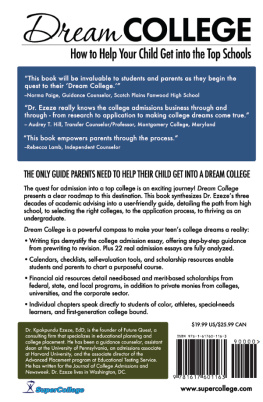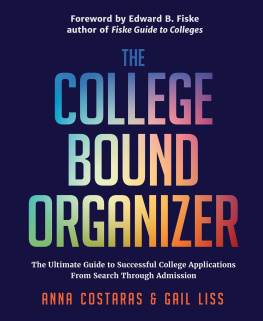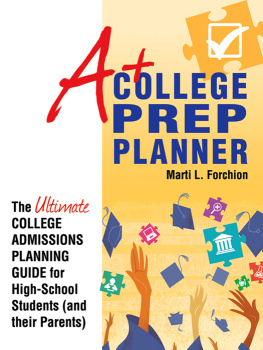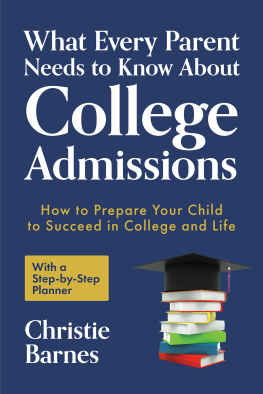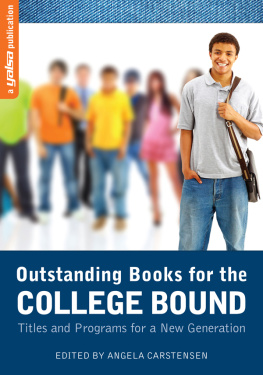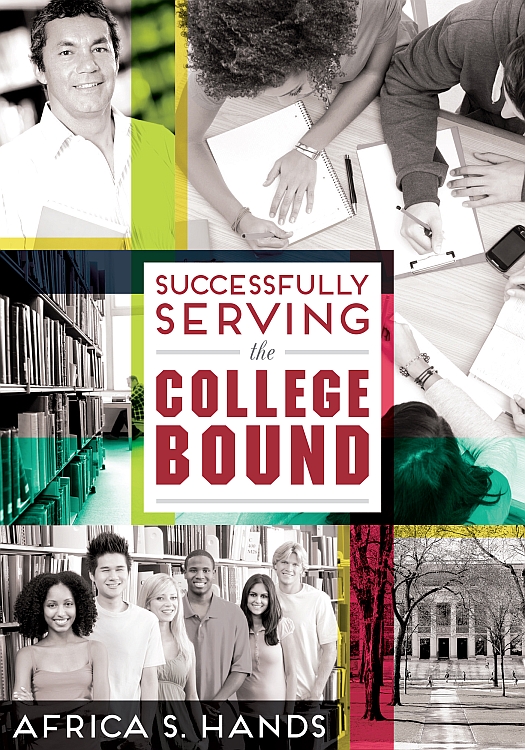
ALA Editions purchases fund advocacy, awareness, and accreditation programs for library professionals worldwide.
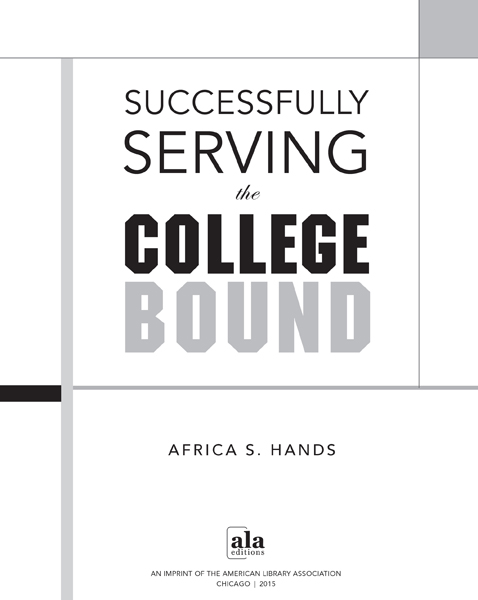
AFRICA S. HANDS received an MLIS from San Jose State University and an MA in Counseling Psychology from Golden Gate University. She has worked in public and academic libraries, and in undergraduate and graduate admissions and advising at public and private higher education institutions. She is active in ALA, and serves on ALSC, ASCLA, and NMRT committees; reviews online resources for Technical Services Quarterly; and presents at conferences and workshops. Africa is academic coordinator for Project Graduate at the University of Louisville.
2015 by the American Library Association
Extensive effort has gone into ensuring the reliability of the information in this book; however, the publisher makes no warranty, express or implied, with respect to the material contained herein.
ISBNs:
978-0-8389-1272-0 (paper)
978-0-8389-1279-9 (PDF)
978-0-8389-1280-5 (ePub)
978-0-8389-1281-2 (Kindle)
Library of Congress Cataloging-in-Publication Data
Hands, Africa S.
Successfully serving the college bound / Africa S. Hands.
pages cm
Includes bibliographical references and .
ISBN 978-0-8389-1272-0
1. Libraries and studentsUnited States. 2. Libraries and collegesUnited States. 3. College student orientationUnited States. 4. Universities and collegesUnited StatesAdmission. I. Title.
Z718.7.H36 2015
025.5dc23 2014027916
Cover design by T. J. Johnson.
CONTENTS
Working in a public library requires staff and administrators to be attuned to the many types and needs of current and potential library patrons. Just when you think the library has an understanding of the service and program needs of one population, another special population or subgroup of patrons need or want specific services or programs. From children with special needs, to patrons whose native language is not English, to seniors in the community, the library is often considered the one place where all are welcome, and, for the most part, can find information and programs to suit personal needs and interests. Given the inherent educational value of the public library, one might expect to find services or programs geared toward patrons with higher education aspirations.
Librarians and other library staff members work with patrons throughout their life cycles. We see children on their first day of kindergarten, and again when they enter middle and high school. Over time we get to know our patrons personal histories as well as their reading preferences. The reference desk is not just a place to learn about the latest bestseller; it is where patrons share what is happening in their lives. We are privy to their life events and their goals, which may include pursuing a college degree or other postsecondary training. Library staff can be trained about available resources so that they are able to have informed conversations with patrons interested in exploring higher educationnot as advisors, but as reference professionals qualified to make educated recommendations.
My review of public library websites revealed that not only do many libraries not have college-related information and links on their websites, few have specific programs for college-bound patrons of any age. This, of course, is only one state; many librarieslarge, medium, and small; and suburban, urban, and rural, do a good job of serving college-bound patrons, particularly those of traditional college-going age. Successfully Serving the College Bound recognizes that librarians and other library staff members have different levels of expertise related to college planning, and patrons have different levels of needs. For libraries interested in starting or improving services and programs for college-bound patrons, this book provides tips and information from librarians who have planned both large and small programs to connect with their college-bound community.
For nearly ten years, I have helped students of all ages navigate the maze of college admissions. Some are adults who are interested in graduate study but lack undergraduate degrees, and are unaware of the steps they are expected to follow to pursue graduate-level education. They have the necessary interest, will, and support, but lack information. Others are like the parents who contact a colleges admissions office in April to find out how to enroll their son, who is about to graduate from high school, for the upcoming fall semester. He has worked hard on his studies and earned good grades but has not yet applied for admission. The parents have no idea that he should have applied for admission the previous fall. The deadline for admission to the freshman class has passed, the entering class has been admitted, and students have already accepted places in the freshman class. In this case, although the teen has grades and test scores that meet admissions requirements, he did not have enough information about the admissions process to secure a place. The family now has to work on plan B.
Changes in the economy call for changes in our patrons skill sets and knowledge bases. Todays college-bound community includes students of all ages and backgrounds who are interested in different educational experiences that range from a traditional campus, to flexible online or evening and weekend programs, to vocational and career-focused programs. Some patrons are returning to college after taking several years off because of professional, financial, and family obligations. Others are first-generation students with little or no access to college advisors. Still others, like students with disabilities or military-service members, have special needs and require assistance to navigate the college-planning process. In my experience, many students do not know how to select and apply to collegewhat questions to ask, what accreditations to look for in a college, or what financial aid and scholarship opportunities exist. Some prospective students do not know that all colleges and universities are not the samethere are public, private, and for-profit institutions, some of which are research universities and others liberal arts colleges, each offering different majors and extracurricular activities.
Successfully Serving the College Bound was written because college-bound members of our community need our help, and public libraries are equipped to provide access to resources and programs that will help patrons get on the right track to obtain a college degree or other post-secondary training. This book includes worksheets to help you begin taking inventory of your librarys programs, resources, and your staffs skills and interests; presents programming ideas for a different types of college-bound patrons; and reviews online college-planning resources. I hope Successfully Serving the College Bound helps you to research your college-bound community, brainstorm community partners, and create programs to support the educational pursuits of your patrons.
Thank you to Jack Montgomery, professor and coordinator of collection services at Western Kentucky University, for stopping by my poster session at the Kentucky Library Association conference and inviting me to write an article about college-planning resources for Against the Grain. Thank you to Cheri Voellman for coaching me chapter-by-chapter and helping me stay on task, and for your emails acknowledging my progress. Thank you to my first editor, J. Michael Jeffers, and my second editor, Jamie Santoro, for taking the reins and being a genuine delight to work with. To those librarians and administrators who work tirelessly to help patrons plan for and succeed in college, including Christine Caputo, Erin Derry, Pam Edwards, Rosy Henderson, Danielle McGavock, Donna Pesce, Isamar Ramirez, and Judy Reno, thank you for your willingness to be interviewed and share your experiences. This project could not have been completed with the support of my partner, Debra J. Mumford. Thanks for celebrating each completed chapter. And a special thank you to my mother, Valerie A. Lloyd, and sister, Estelle Paysinger-Hill, for your support and love.
Next page
